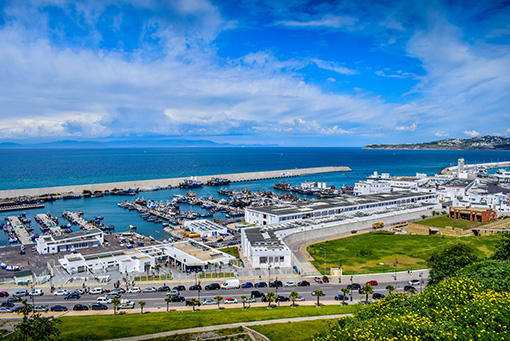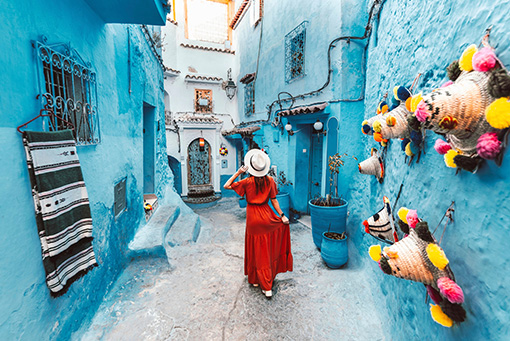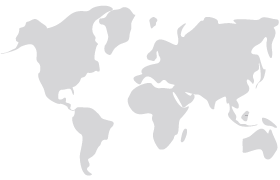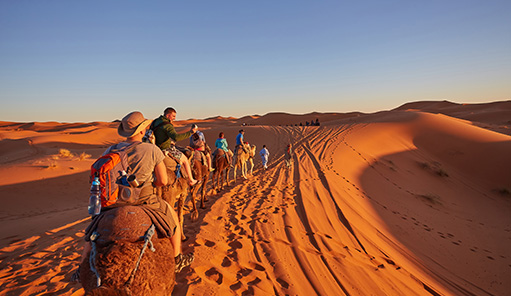Situated in North Africa, Morocco is spoilt with diverse landscapes, including the Sahara Desert and Atlas Mountains. Its location on the Northwest corner of Africa places it near Europe, influencing its language, culture, and food.
The climate varies considerably depending on your location, but you can expect calm, wet winter weather and intensely dry summers with highs of 35°C or higher inland.
While Berber and Arabic are the official languages, French is primarily used in professional settings and English is widely spoken.
Visa requirements for Morocco
The first step on your move to Morrocco is sorting out your visa. Make sure you apply well in advance of your departure date as the process can take several weeks, depending on the visa:
- Tourist Visa: Citizens of the UK, US, and EU don’t need a visa for stays shorter than 90 days. If you’re not sure whether you need a visa, you can check on the official e-visa website of the government of Morocco.
- Work Visa: You will need a visa sponsored by a Moroccan company to live and work in Morocco.
- Long-Term Visa: If you’re planning to settle, you’ll need to apply for a residency permit (Carte de Séjour). This requires proof of financial independence, a lease agreement, and more.
- Proof of Sufficient Funds: You will need to prove that you have sufficient funds to sustain yourself and your family while in Morocco.
- Medical Certificate: A medical certificate proving you are in good health is required when entering the country.
- Interview: As part of the process, the Moroccan embassy might request a short interview with you.
Flight times to Morocco
- France – 3.5 Hours
- Spain – 2 Hours
- United Kingdom – 3.5 Hours
- Italy – 3 Hours
- United States – 7 to 12 Hours
Why are companies choosing to operate in Morocco?

Free Trade Agreements: The EU and USA have free trade agreements with Morocco. This ensures that these countries get preferential access to large markets and the ability to target new markets as they emerge.
Stable Political Climate: Morocco’s political stability, in conjunction with its location, has made it a sought-after destination for doing business.
Diversifying Economy: It has done an excellent job of diversifying its economy beyond manufacturing and tourism, venturing into software development, renewable energy, and even automotive manufacturing.
Morocco is the Gateway to Africa: With its easy access to Atlantic Ocean shipping routes and its proximity to Europe, Morocco’s location facilitates international trade and makes it a popular starting point for European and American companies trying to enter the African market.
Popular areas in Morocco for expats
Whether you prefer sprawling cityscapes or relaxing beachfront views, you’ll be spoilt for choice in this stunning corner of the world. To narrow down your options, below is a list of the most popular cities for expats in Morocco.
Casablanca: Morocco’s largest city and economic hub, this city features incredible architecture with a notable French influence. The Southeast of Casablanca hosts Quartier Habous, a square lined with trees, arcades, and stylised buildings. Expats in Casablanca typically gravitate toward bustling residential suburbs like Gauthier, Anfa, Maarif, and Racine.
Fes: This car-free city feels like a trip back in time. As home to the world’s oldest university and the only remaining authentic Arabic market, the city is also partially classified as a world heritage site. Animal-drawn carts, wicker baskets, and fresh spices line its truly ancient streets. The most popular suburb among expats in Fes Ville Nouvelle, thanks to its modern aesthetic, access to amenities, and proximity to sought-after schools.
Marrakesh: Known as the Pink City thanks to the reddish sandstone used in its construction, there is plenty to do in Marrakesh including street performances, cafés, and street food vendors. Some of the most popular expat suburbs in Marrakesh are Gueliz, Hivernage, and The Medina.
Rabat: Morocco’s capital city faces the Atlantic Ocean and features palm trees, beaches, and loads of internationally acclaimed restaurants. New developments in Rabat are a favourite among expats, not to mention Rabat’s sister city Salé, which has seen a steady increase in expat residents too. Expats generally flock toward suburbs like Souissi, Hassan, and Agdal in Rabat thanks to their proximity to various international embassies.
Tangier: Positioned on the northernmost tip of Morocco, you can see Europe from Tangier when looking across the Gibraltar Straight. Having invested in hotels and its marina, the city hopes to attract more tourists, but if you’re looking for seclusion, we recommend residing in the old town area. Plenty of merchants, old architecture, and maze-like streets provide an authentic Moroccan experience. Expats are usually attracted to more the city’s upscale suburbs, namely Marchan, California, and Malabata, due to their luxurious properties and views.
Setting up services in Morocco
- Registration: Anyone intending to reside in Morocco for more than 90 days must apply for a residency permit. Doing this allows you to obtain any official documents you may need and grants you access to local services like mail delivery. All you need to register is proof of identity and proof of residence within the municipal district in question.
- Water and Electricity: Société Régionale Multiservices (SRM) oversees water and electricity supply throughout Morocco. Your landlord will be able to activate these utilities on your behalf if you provide a copy of your passport and residency permit. Bills are paid monthly.
- Delivery & Mail Services: Morocco’s postal service is run by La Poste Maroc, a state-owned company. Mail services are activated once you register with your local municipality and confirm your residential address. You must register to receive mail.
- Wireless and Fibre Internet: Various providers are available with monthly payment plans. Service packages start from 418.75 MAD (41.84 USD). Among the most reputable providers are Orange and Inwi that offer fibre connectivity for 349 MAD (36.17 USD), and Maroc Télecom, which offers a 100mb fibre connection from 500 MAD (51.82USD).
- Gas: Canisters are readily available should you need gas for cooking and/or heating. Expect to pay around to 50 MAD (5.14 USD) for a 12kg canister.
Cost of Living in Morocco
- Housing: While villas, riads, and houses are available, apartments are the most common dwelling type in Morocco and the most popular choice for expats. In the city centre, expat-rich neighbourhoods tend to offer one-bedroom apartments anywhere between 7,000 MAD to 25,000 MAD per month (725.48 USD to 2591.01 USD).
- Food: Food from local markets is more affordable, while supermarkets are more expensive but offer a wider variety of goods. Smaller stores are known as hanouts, and they generally don’t accept card payments. Bim, Kazyon, Marjane City, and Carrefour City are the major supermarkets in Morocco, with only Carrefour and Atacadao being licensed to sell alcohol. All supermarkets accept local and international card payments.
- Tax: How much tax you pay is dependent on your income. Additionally, if you don’t habitually live in Morocco, you are only subject to tax on your local income. Habitual residents can be taxed up to 40% of their worldwide income.
- Transportation: Commuting via taxi or e-hailing services like Indrive is easily the cheapest way to get around Morocco, in addition to being relatively safe and reliable. Purchasing a vehicle on the other hand can prove quite expensive, and not ideal considering the availability of public transportation.
- Childcare: Childcare is relatively inexpensive, even compared to other African countries. However, primary schools tend to be more expensive than preschools on average.
- Recreation: Leisure activities are also inexpensive and plentiful. Cinemas, fitness clubs, and restaurants are popular and plentiful. Expats can also enjoy outdoor activities like surfing, camel trekking, desert camping, and sand boarding.
| Food | Price in MAD | Price in USD |
| Milk (Regular) (1L) | 8.76 MAD | 0.90 USD |
| Eggs (12) | 19.20 MAD | 1.98 USD |
| Chicken Fillets (1kg) | 59.00 MAD | 6.07 USD |
| Loaf of Bread (White) | 4.17 MAD | 0.43 USD |
| Bottle of Wine (Mid-Range) | 60.00 MAD | 6.17 USD |
| Accommodation | Price (Monthly) | Price (Monthly) |
| Apartment (1 bedroom) in City Centre | 4,325 MAD | 444.92 USD |
| Apartment (1 bedroom) Outside of Centre | 2,625 MAD | 270.04 USD |
| Apartment (3 bedrooms) in City Centre | 6,714 MAD | 690.69 USD |
| Apartment (3 bedrooms) Outside Centre | 3,416 MAD | 351.41 USD |
| Transportation | Price | |
| One-way Ticket (Local Transport) | 4.50 MAD | 0.46 USD |
| Monthly Pass (Regular Price) | 100.00 MAD | 10.29 USD |
| Taxi 1km (Normal Tariff) | 5.00 MAD | 0.51 USD |
| Volkswagen Golf 1.4 Trendline (Or Equivalent New Car) | 340,000MAD | 34976.68 USD |
| Recreational Amenities | Price | Price |
| Fitness Club, Monthly Fee for 1 Adult | 219.79 MAD | 22.61 USD |
| Cinema, International Release, 1 Seat | 62.50 MAD | 6.43 USD |
| Meal, Inexpensive Restaurant | 31.00 MAD | 3.19 USD |
| Domestic Beer (0.5 litre draught) | 50.00 MAD | 5.14 USD |
Source: numbeo.com
Morocco: Banking and Tax Requirements
To open a bank account in Morocco, you will need the following documents:
- ID or Passport
- Proof of residence: Any documentation verifying that you currently reside in Morocco.
- Proof of stable income: Pay slips or existing banking history to prove that you have a steady stream of monthly or weekly income.
In terms of banking fees, you can expect to pay an opening fee, a minimum deposit fee, transaction fees, and a monthly admin fee that averages at around 15 MAD (1.50 USD).
Attijariwafa Bank and Bank of Africa are the most reputable and trusted banks in Morocco, and each has a comprehensive national footprint.
There are two types of bank accounts available:
- A currency account: used only to receive money from abroad. You can open a currency account immediately upon your arrival in Morocco. The only documentation required is your passport.
- A convertible account (in dirhams): used to receive your salary and transfer money. The documentation required to open a convertible account includes: a valid work permit, a residency card, your passport and a Moroccan contact number. If you are not classified as a resident of Morocco, you will only be able to deposit money from abroad directly into your Moroccan convertible account if it is transferred from an existing account in your home country that has been declared to customs.
Schooling in Morocco

Students in Morocco attend mandatory primary schooling for a total of 9 years. This is followed high school for an additional and voluntary three years until their final graduation. Tertiary studies can then be undertaken if desired.
Primary through secondary education:
Children attend primary school (grades 1 – 6) for 6 years. They then complete an additional three years of basic education (grades 7 – 9), followed by three more years of general secondary education (grades 10 – 12). Depending on the school, lessons are taught in Amazigh (the largest local dialect), French, Arabic, or English.
While public schools are free, private schools can cost up to 50,000 MAD (4995.80 USD per year).
There are also various international schools available:
- British International School of Casablanca
- Casablanca American School
- British Academy School Marrakech
- Lycée Descartes
- Rabat American School
- George Washington Academy American Academy
- British school of Casablanca
Vocational education:
Offering instruction in various occupations, from mechanical engineering to agriculture, vocational institutions are plentiful in Morocco. Children are eligible to attend vocational institutions once they have completed secondary education, usually at the age of 16-17. Vocational courses can last anywhere between a few weeks to 3 years, depending on the vocation. While public schools can cost just 500 MAD per year (51.44 USD), private vocational institutes can cost 50,000 MAD per year (4995.80 USD).
Popular vocational institutions:
- High Technology School in Morocco
- Collège LaSalle
University/Tertiary institutions:
Morocco has numerous public and private universities offering courses in business management, engineering, IT, design, teaching, and much more. While public universities are generally free to attend, the most sought-after ones are not, costing up to 100,000 MAD per year (10287.26 USD).
Popular institutions:
- Al Akhawayn University
- International University of Rabat
- Université Internationale de Casablanca
Moroccan Healthcare and Medical Insurance
- Health consultations: Consultations for common illnesses and injuries cost around 150 MAD (15.55 USD), while specialist appointments generally cost around 300 MAD (31.09 USD). These fees can be claimed back through your health insurance or Morocco’s Caisse Nationale de Sécurité Sociale (CNSS).
- Hospitals and emergency care: Hospitals, both public and private, will administer emergency care to patients and request payment afterwards. Public health insurance does not cover hospital admission entirely, only a portion of the cost and only at certain hospitals. Expats are generally advised to get private insurance for faster, better-quality care.
- Mandatory health insurance (AMO): In 2006, Morocco introduced the AMO, which essentially made health insurance mandatory for all citizens. It covers public and private healthcare providers, and there are many degrees of coverage to choose from. This ensures that everyone has an option to meet their specific needs.
- AMO Tadamon (low-cost social healthcare system): Households who earn under 300 MAD (30.90 USD) per person per month qualify for free healthcare through this programme, at both public and private institutions.
Employment Opportunities in Morocco

Companies in Morocco are seeking skilled labour in various fields as the country’s economy continues to grow and diversify. Below are some of the more sought-after skills in 2025.
- Tourism and Hospitality: Thanks to the country’s incredible landscapes and vibrant cities, there is no shortage of jobs in hotels, restaurants, and even tour agencies.
- Agriculture and Fisheries: Unmatched by other Arabian countries, Morocco has 85,000 square kilometres of arable land, making it one of the most fertile countries in the Arabian world. This creates many job opportunities in agriculture and fishing.
- Education and Healthcare: English teachers and lecturers are in high demand. In healthcare, doctors, nurses, dentists, and mechanical technicians are sorely needed.
- Information Technology and Communications (ICT): Thanks to Morrocco’s rapid development, many companies are seeking software engineers, app developers, and data scientists.
- Manufacturing and Industry: This sector continues to play an important role of Morocco’s economic growth. Expats will find there are many vacancies for production and maintenance engineers. Logistics and quality control jobs are also plentiful.
Landmarks and Hotspots
- Marrakesh: Whether you’re touring age-old palaces, watching street performers, or buying from street vendors, iconic Marrakesh has something for everyone.
- Anti-Atlas: From trail hiking to mountain biking, the Atlas Mountain range has you covered. Additionally, you can take in the stunning scenery over several days if you decide to embark on a multi-day camping trip.
- Aït Ben Haddou: Made popular thanks to movies like Gladiator and Kingdom of Heaven, this fortified village from the 11th century is well-preserved and an excellent spot for hiking or a leisurely sunset walk.
- Taghazout Bay: A surfer’s paradise on the Atlantic Ocean, this stretch of coastline from Essaouira to Sidi Ifni is known for its fishing spots, cafes, grills, and rooftop yoga classes. Visitors will be treated scenic views and an incredible cultural experience at the nearby village of Taghazout.
Moroccan customs and culture

- Greetings: Greetings in Morocco are usually formal, often involving handshakes with your right hand and Arabic expressions of goodwill. The preferred greeting is As-salaam ‘alykum (peace be upon you).
- Dress modestly: Everyone is expected to dress modestly, particularly in religious settings. This means covering your shoulders, arms, and legs. The cultural norm is to opt for loose fitting clothing, sober necklines and layers.
- Remove shoes indoors: It is customary to remove your shoes before entering someone’s home. This practice, which is also followed in mosques, is a sign of respect.
- Respect personal space: An important aspect of Moroccan culture is respecting the personal space of those around you, regardless of the setting. This means not standing or sitting too close to others in public spaces, not engaging in excessive physical contact with new acquaintances, and not making those around you feel crowded regardless of the setting.
- Be mindful of public displays of affection: these are rare and can be frowned upon.
- Be hospitable: Moroccan hospitality is world-renowned. Guests are greeted with a deep warmth, the utmost respect, provided with mint tea, and made as comfortable as possible. If you are invited to someone’s home, it is customary to bring a small gift to show your appreciation.
- Bargaining is normal: In traditional markets, haggling for goods is expected and even welcomed. Doing so in good faith is perfectly acceptable. Usually, your first offer should be around 50% or less than the asking price.
Best ways to get around Morocco
- Taxi: Readily available and great for short trips, the taxi system in Morocco is extremely efficient. You can haggle for better fares, but it’s advisable to insist that the meter be activated at the beginning of your journey and stopped at the point of arrival.
- Grand Taxi: Also readily available and commonly used to travel longer distances between cities and towns. These are best shared to reduce costs.
- Train: Available in most cities, these are also used to travel between city centres. The rail network does not extend to smaller, rural areas, however.
- Buses: Larger cities like Casablanca, Marrakesh, and Rabat operate public buses between central and suburban areas. Depending on the city, you can buy your ticket at the kiosk or directly from the driver. There are also several privately owned bus companies that specialise in intercity travel.
Your seamless transition to Morocco with AGS Movers
With its unique blend of history, culture, and opportunity, Morocco is the ideal country to begin a fresh and thrilling chapter in your life. To set yourself up for success from the very beginning, make sure your move is tranquil and stress free.
AGS Movers is here to help make your move go smoothly. From our secure storage services and carefully packing and shipping your belongings to efficiently managing customs formalities and ensuring timely delivery, we provide comprehensive moving services tailored to your needs, including consolidated shipping.
Choosing AGS Movers means choosing a hassle-free, expertly managed move, allowing you to focus on settling into your new home and starting your new chapter in Morocco with ease.


 Paris
Paris














